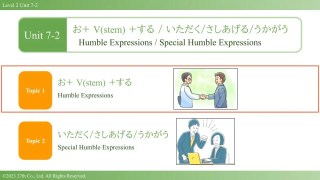Welcome to Level 2, Lesson 7!
Building on your knowledge of honorifics, Lesson 7 at gokigen japanese blog introduces another crucial aspect of Japanese politeness: humble expressions (謙譲語, kenjōgo). These forms are used to humble oneself or one’s in-group when speaking to someone of higher status, thereby showing respect to the listener. This lesson also equips you with versatile patterns to precisely describe the timing of actions.
The main goals of this lesson are to enable you to use humble expressions towards oneself and one’s inner circle according to social hierarchy and to express emphasis on the timing of actions.
Key grammar patterns and expressions you will master in this lesson include:
- Humble Expressions for Oneself / In-group (謙譲語): Understand the concept of humbling your own actions or those of your family/company members to show respect to the listener. This is distinct from honorifics, which elevate the listener’s actions.
- General Humble Form (お + V(stem) + する): Learn how to form humble expressions for most verbs by attaching お (o) before the verb stem and する (suru) after it (e.g., お待ちします – I will wait (humble); お届けします – I will deliver (humble)).
- Special Humble Verbs (特別な謙譲動詞): Discover specific verbs that have irregular, unique humble forms. These include いただく (itadaku – humble for “to eat/drink/receive”), さしあげる (sashiageru – humble for “to give”), うかがう (ukagau – humble for “to ask/visit/hear”), and more.
- Expressing Action Timing: “Just Before / In the Middle / Just After” (~ところ): Master the highly versatile V(short) + ところ (tokoro) pattern. This expression indicates:
- V-る ところ: “about to do ~” (e.g., 今から出発するところです – I’m about to depart now).
- V-ている ところ: “in the middle of doing ~” (e.g., 今勉強しているところです – I’m in the middle of studying now).
- V-た ところ: “have just done ~” (e.g., ちょうど食べたところです – I’ve just eaten).
- Expressing Recently Completed Action (~たばかり): Learn how to use V-た + ばかり (bakari) to state that an action “has just been done” or “has recently been completed.” This emphasizes the freshness or recency of the action (e.g., 会社に入ったばかりです – I’ve just joined the company).
By the end of Lesson 7, Level 2, you’ll be able to gracefully humble your own actions and those of your in-group in conversations with superiors, and you’ll gain the ability to express the precise timing of actions. These advanced politeness forms and timing expressions are crucial for natural and sophisticated Japanese communication!
Explore the articles linked below to master Japanese humble expressions and action timing!






